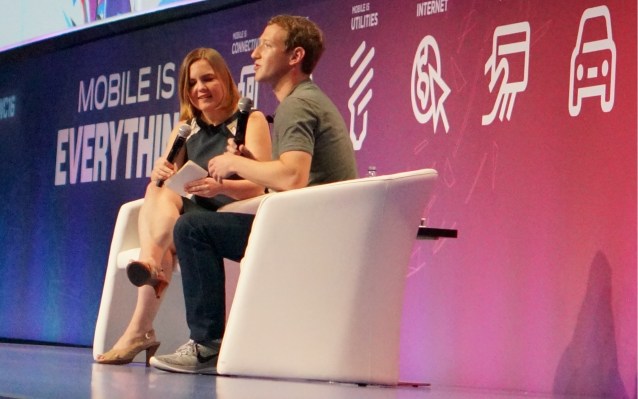Facebook had a high-profile setback when its Free Basics mobile connectivity program got blocked in India earlier this month over net neutrality issues, but its CEO Mark Zuckerberg is adamant — even upbeat — about the social network continuing to look for other ways to provide services to more users anyway, including laser transmissions from light aircraft and some 10,000 old school hotspots.
“That’s disappointing for the mission and a major setback,” Zuckerberg said of the India decision, “but every country is different.”
Speaking at a fireside chat at the Mobile World Congress in Barcelona mired with a lot of audio issues, the conversation covered a range of topics from Facebook’s connectivity mission, to virtual reality, 5G and its sucky start in mobile, Zuckerberg also shrugged off the criticism that the company has had about what its real motives are for Internet.org, the umbrella organization that is behind all of these projects. Some believe Facebook’s interest in connectivity is less humanitarian and more opportunistic — a way of building its advertising network.
“We don’t need to have people care about it we care about it,” he said, referring to Facebook’s own sense of mission in the project. “We believe that everyone should have access to the Internet, and it’s kind of crazy that we’re sitting here and 4 billion people in the world don’t,” he had explained earlier.
While the Free Basics program has been shut down one of the world’s biggest mobile markets, it’s continuing to grow elsewhere, with programs rolled out jointly with mobile carriers in some 38 countries to date.
Today Zuckerberg also gave a light update on Facebook’s bid to build Internet drones and solar-powered planes that can stay in the air for six months, which will have two parts to it, he explained: its size and how it will deliver the connectivity.
“It will have the wingspan of a 747 but weighs as much as a car, very light,” he said. “And the other piece is a laser comms system twelve times faster to beam down access. With a laser you can get higher bandwidth.”
Putting aside any concerns of what a Facebook laser might imply in terms of the company’s power, Zuckerberg also said that Facebook would launch its first satellite this year as another connection option, alongside its other work on extending infrastructure, which Facebook announced this morning.
And in India, “we’re going to focus on different programs,” he said, highlighting one of the contention points of Free Basics, that it was tied to a particular operator and to particular services. “We want to work with all the operators there.”
Some of that will be more low-end forms of connectivity: such as WiFi hotspots. Describing it as “a different version of the business model of extending Internet,” he said Facebook is “optimistic about [WiFi].”
“We expect to have ten thousand hotspots out there and plug them into existing networks.”
On other subjects, he was very defensive about Facebook getting accused of simply being interested in making money. “I think that a lot of people think that companies just care a lot about making money,” he said. “But I built Facebook because I wanted to connect people at college. I never thought we would make money.” But, building it as a company, he said, helped Facebook bring together some of the most talented engineers and other tech people in the world. “So we have a mission and we also need to make money.”
He also lashed out at what he thinks has been some poor development from the rest of the mobile industry. “It’s disappointing, this idea that 4G was about a good experience and 5G is about things. That’s important; making sure devices are connected is good, but … we’ll be sitting here in 2020 and instead of just 4 billion offline there will still be 3 billion…. I hope the folks here will focus on both priorities, bandwidth and but also making sure people finish this job and people have access.”
Unsurprisingly, the discussion also touched upon Apple’s current stand-off with the FBI around its stand on encryption. Facebook previously released a statement that noted the company was sympathetic to Apple’s cause.
Zuckerberg expanded upon this formal statement today, though. “We are sympathetic with Apple,” he said and noted that Facebook believes in encryption and that he thinks “it’s an important tool.”
He qualified this a little bit, too, though.
“At the same time, we feel like we have a pretty big responsibility running his big network and community — to help prevent terrorism and different kinds of attacks — and we have strong policies on this. […] If we have the opportunity to basically work with government folks to make sure there aren’t going to be terrorist attacks, we’ll do that.” Zuckerberg said that Facebook does this to “make sure society is safe” but he then also stressed that he doesn’t think backdoors are “the right thing to do” and won’t enhance security.
Talking about video on Facebook, Zuckerberg also noted that he believes video and messaging apps may provide a relief to people who think all of their photos now have to be perfect (and put their life into a perfect light). “One of the things we see online is that as people share more and more, there is increasing pressure to do well,” Zuckerberg said. “In 2016, if you are sharing a photo, you want it to be a good photo.What’s powerful about messaging platforms like Messenger and WhatsApp — and now video, too — is that it gives people a more intimate environment — and raw environment.”
Facebook, of course, also owns Instagram — a service that’s all about sharing perfect pictures. Zuckerberg did not say anything about that service. So far, Zuckerberg himself has only shared 18 photos publicly on Instagram — 17 of these include his dog.
